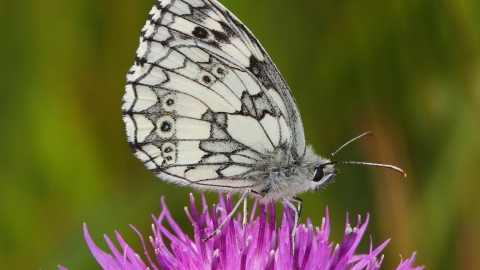
Marbled white butterfly. Photo, Chris Root
Mambury Moor
Know before you go
Dogs
When to visit
Opening times
Open at all timesBest time to visit
May to SeptemberAbout the reserve
The site comprises five fields, two of which have undergone limited agricultural improvement in the past. The fields are quire exceptional and include areas of 'smooth Culm', where purple moor grass dominates. Wavy St. Jon's wort, a rarity confined mainly to Culm grassland, is abundant. The SSSI is a stronghold of marbled white butterflies.
Ash dieback
The disease ash dieback is now widespread in the UK and is present at many of our nature reserves, so we carry out tree felling across our sites in winter months. For your own safety please observe temporary path diversions and closures.
Where possible we will leave affected ash trees in place to decay naturally as an important habitat for wildlife. We plan to only fell diseased ash trees which pose a threat to people or infrastructure. Before trees are felled, we will check whether any rare or protected wildlife is present. If it is, we will postpone or avoid felling these trees. No felling will take place during the bird nesting season.
DWT’s Saving Devon’s Treescapes project are working with communities, landowners and businesses to help make Devon's precious treescapes more resilient in the face of ash dieback. Find out how you can get involved here.
NOTICE: If you are visiting our reserves, please note that there have been instances of H5N1 Avian bird flu found in birds in Devon. There is very low risk to public health, but we do ask that if you come across any unusual or unexplained bird deaths on or near our reserves, please do not touch them and avoid allowing your dog to come into contact with dead birds. Please report them to Defra here or call 03459 335577 and also report your findings to DWT by email at contactus@devonwildlifetrust.org.



